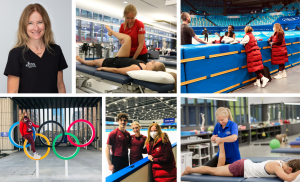Josiane Roberge

Photo credits : Photo courtesy of Josiane Roberge / INS Québec
Professional background
Profession: Physiotherapist
Olympic Games: Beijing 2022
Beijing 2022 Sport: Figure Skating
Q. Was there a specific point in your life when you realized you wanted to work with high-performance athletes and Olympic athletes?
A. “It started with the Montreal Olympic Games in 1976. I was still very young at the time, but I was fascinated by the scale of this sporting event and by Nadia Comaneci’s performances. I think I already knew at that time that I wanted to get involved in this field, although I didn’t yet know what role I wanted.”
Q. What exactly is your role for these Games, and which sport are you with?
A. “I am the physiotherapist for the Canadian figure skating team. I worked with the integrated support team (IST) that prepared the athletes for the big day. One of my roles is ensuring that they don’t get injured and that they are in good physical health so that they can perform to the best of their abilities.”
Q. What fuels your passion for your work?
A. “The bond I have with the athletes I look after, and the sense of teamwork with the coaches and other sports scientists. Physiotherapy is constantly evolving. We are able to learn and improve all the time. Working in high-performance sport, I’m also lucky enough to experience some powerful emotional moments.”
Q. What activities do you do to relax and switch off from work?
A. “I run, cycle and go cross-country skiing. I love doing sports in nature — it’s so calming. I’m lucky to have a very sporty spouse who does these activities with me. I try to exercise regularly and put my phone on silent sometimes, especially at meal times. Also, I’m really organized and set aside time to do other things outside of work.”
Q. Can you share with us a key aspect of your professional philosophy as a physiotherapist?
A. “An athlete’s well-being is more important than their performance. I keep this in mind, no matter what is at stake.”
Q. What perspective do you think your own experience as a figure skating athlete has brought to your role within this sport?
A. “I have worn many hats during my time in this sport: athlete, coach, judge and mother of a high-performance athlete. This means that I have a comprehensive understanding of the sport, be it from a technical point of view or in terms of the support I provide to coaches and parents.”
Q. How do you feel when you see the athletes you have been treating for years achieving their dreams?
A. “I’m so happy for them! There are several athletes who I’ve been working with since they were juniors. I’ve been able to see their progress, the commitment and sacrifices they have made, and the obstacles they have overcome in order to make it to the Games, and I’m hugely impressed.”
Q. Is there a quote that inspires you?
A. “Remember to look up at the stars and not down at your feet. Try to make sense of what you see and wonder about what makes the universe exist. Be curious. And however difficult life may seem, there is always something you can do and succeed at. It matters that you don’t just give up.” — Stephen Hawking.